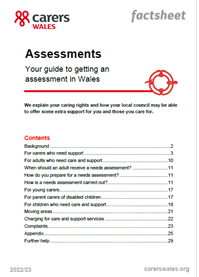Why have a carer's needs assessment?
Getting a carer’s needs assessment could be the first step to gaining vital support. It’s your chance to discuss the help you need as a carer. Find out how it could make life easier for you and the person you care for.
Don’t be put off by the word ‘assessment’ – it’s certainly not a test of your abilities as a carer. It’s a chance to let your local council know how your caring responsibilities affect you physically and emotionally. They will use the assessment to find out what support you need, whether you’re willing or able to carry on caring, what you want to achieve in your daily life and whether you qualify for help.
Most assessments are carried out face to face, although some local councils offer the option to have the assessment online or over the phone. It should be done at a time and place that is convenient for you. The assessment may also happen in more than one part with the first part being called a 'What Matter's' conversation.
Some local care centres will also carry out carers’ needs assessments – it’s worth checking with your local carers organisation.
Anyone of any age in Wales who provides caring responsibilities to a friend or family member, is entitled to a carer’s assessment. It doesn’t matter how much or what sort of care you provide. For more details, see our ‘Assessments’ factsheet.
A carer’s assessment is different from a needs assessment, which is for the person you are caring for. You can have them both done at the same time if you want. You’re entitled to a carer’s assessment whether or not the person you care for has had a needs assessment.
Contact adult social services at your local council or trust (in Northern Ireland). If the person you care for lives in another area, contact their local council or trust instead (except in Wales, where you should still contact your own local council.)
If you’re a carer for your child, contact the children with disabilities department.
The assessment will last at least an hour. You can ask to have someone with you such as the person you care for, a friend or relative.
Collect all the relevant information you’ll need:
- your NHS number
- your GP’s name, address and phone number details
- your email address
- contact details of anyone coming to the assessment with you
- details of the person you care for including their name, address, date of birth and NHS number.
Things to think about beforehand
- Make a list of the different ways you are providing support, such as offering emotional support, managing finances, helping someone with practical activities such as shopping, ensuring someone is safe from harm, or helping with personal needs such as using the bathroom.
- Consider how caring affects your life. Does it leave enough time for you? Does it affect your emotional wellbeing – for example, do you often feel drained or lonely? Does it affect you physically – for example, do you lose sleep or get back ache from lifting someone regularly? Has it affected your work, social life or education?
- If the person you care for will be present at the assessment, will you be able to speak freely about any difficulties you have?
The assessor will discuss how caring affects your life, including your physical, mental and emotional needs. They should cover:
- your role as a carer
- how you feel about caring
- whether you’re able or willing to carry on as a carer
- your health
- your work
- other caring responsibilities
- what you enjoy doing in your free time
- planning for emergencies.
Be honest and realistic about your caring role. If you put on a brave face or play down any difficulties, you could miss out on help and support.
Your local council or trust will work out whether your needs are eligible for support. If so, they will create a support plan for you. They might provide you with care and support directly, or provide it to the person you care for.
If you’re not eligible for support, they must still give you information and advice on where you can go for help.
There are lots of different types of support you could be entitled to, including:
- practical help with housework or gardening jobs
- training to help you with your caring role, for example in moving and handling the person you care for
- equipment or alterations to your home
- emotional support such as counselling
- breaks from caring, such as respite care for the person you care for
- advice about benefits
- support to improve your wellbeing, such as access to exercise classes, social activities or adult education.
Will I have to pay?
Councils are advised not to charge carers for support provided to them, but some will give you a financial assessment to work out what you can afford to pay. They should never charge for care and support provided for the person you care for. See our factsheet for more information about this.
If you disagree with the decision following your assessment, there are ways to challenge it. See our guidance on making complaints here.
Even if your council or trust claim they can’t give you financial or practical support at the moment, they must still provide you with guidance and information to look after your health, welfare and overall wellbeing and to prevent you from developing support needs in the future.
Latest updates

Carers UK reaction to third reading of the Universal Credit Bill
MPs debated the Universal Credit Bill in the house of Commons on 9th July 2025. The Bill in its existing…

The GP Patient Survey 2025: A widening health gap for unpaid carers
This year’s GP Patient Survey reflects a worrying trend for unpaid carers’ health. 72% of carers said that they have…

Carers UK comments on the publication of the NHS 10-year plan
For a long time, we have said that the NHS needs to transform the way it interacts with unpaid carers.…

Carers UK responds to Government change to the Universal Credit and Personal Independence Payment Bill
During today's debate on the Universal Credit and Personal Independence Payment Bill, the Minister for Social Security and Welfare, Sir…
Got a question about caring?
Every day we hear from people who need help with looking after a friend or family member
Become a member for free
Joining Carers UK is free and takes just a few minutes.


